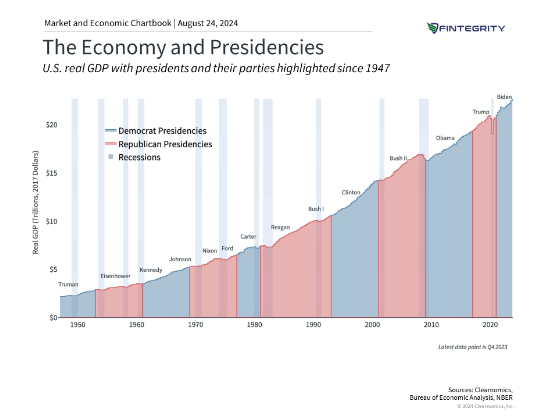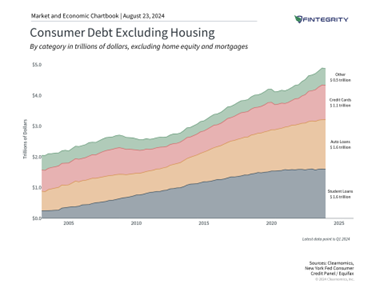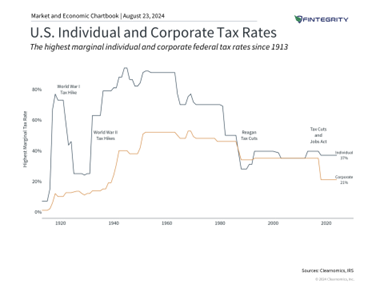As the presidential election looms just two and a half months away, the economic policy platforms of the candidates are only now gradually unfolding. This delayed revelation has stirred concerns among investors regarding the potential impacts on the economy and financial markets. With elections always carrying high stakes, the escalating political divide in recent times has heightened emotions to a boiling point. This message aims to contextualize political anxieties concerning financial markets, offering a nuanced perspective.
The economy is in the spotlight leading up to the election

Political matters play a significant role in our daily lives, influencing aspects ranging from tax obligations to industry rules. This underscores the importance of elections as a means to voice our preferences on various social and economic policies. Despite this, it is crucial for investors to cast their vote at the ballot box rather than through their investment portfolios. History stresses the need to differentiate personal beliefs from financial choices.
When observed from a long-term investment perspective, presidents often receive excessive credit or criticism for economic conditions. The primary drivers of sustained economic performance are the fundamental trends in the business cycle, which wield far greater and enduring influence than the policies of any single administration. Ultimately, business cycles dictate investment returns and the generation of wealth.
This notion is exemplified by the accompanying chart displaying the nation’s gross domestic product levels since World War II. Throughout this period, there have been twelve business cycles and recessions, including recent events like the pandemic-induced crash, the 2008 global financial crisis, and the dot-com bubble burst in 2000.
These occurrences were triggered by external economic shocks and trends largely unrelated to the occupants of the White House. Factors such as globalization, the information technology revolution, and the expansion of financial markets have significantly shaped these periods. The overarching trend is evident: the economy has shown consistent growth over the past eight decades, transcending political affiliations. Irrespective of the presidential administration, businesses strive to boost earnings, which in turn, lead to elevated stock prices.
Consumers are the central focus this election season

Analyzing the broader context of the candidates’ policy platforms is crucial as they unfold. While economic policies are significant, it’s important for investors not to overreact to individual election results or specific policies.
In reality, it’s often the economy that influences elections, rather than the reverse. This is particularly true because the candidates’ platforms typically look back, reflecting on recent household experiences. For example, a recent poll by The Economist/YouGov found that 24% of Americans consider “inflation/prices” as the most pressing issue, followed by “jobs and the economy” at 13%. This is unsurprising given the recent market and economic fluctuations caused by inflation, interest rates, and Fed policy.
Despite significant easing of inflation pressures and a strong economy by various metrics, consumer confidence remains low. This is largely due to the substantial increase in consumer debt, as illustrated in the chart above. Non-mortgage consumer debt has more than doubled over the past two decades under both Democratic and Republican administrations. Credit card debt has reached record highs, while student loan and auto loan balances are rising at their fastest rates since 2003.
Both President Trump and Vice President Harris have centered their economic platforms on consumers. Despite their social disparities, there are notable similarities in their economic agendas. They both address the cost of living, covering expenses like groceries – such as bacon, bread, and ground beef – prescription drugs, and housing. Recently, both candidates have also supported expanding child tax credits and exempting tips from taxation. Politically, it’s logical that both candidates are reaching out to those who feel marginalized due to the economic challenges of recent years.
Taxes and the deficit are also in focus

Expectedly, variations emerge in crucial domains such as taxes and the policy strategies favored by each candidate. Trump leans towards extending his administration’s tax cuts and potentially reducing corporate tax rates. In contrast, Harris emphasizes tax credits for middle- and lower-income Americans, reaffirming the Biden administration’s commitment not to increase taxes for individuals earning less than $400,000 annually. Various provisions of the Tax Cuts and Jobs Act, encompassing reduced individual tax rates, heightened standard deductions, and expanded child tax credits, are set to revert to pre-2018 levels in 2025 unless corrective measures are taken.
Despite apparent disparities between the two factions, many policies persist through transitions of power, with changes being mostly incremental. This continuity in policies is a fundamental aspect of our political framework, requiring widespread support to enact new regulations, even when the president’s party holds sway in Congress. For example, the tax cuts initiated during the Reagan era have endured for decades. Similarly, several tariffs introduced during the Trump administration, though contentious initially, have endured under the Biden administration.
Nevertheless, tax reductions and credits necessitate funding, either through reduced expenditure in other federal budget sectors, enhanced tax revenues, or escalating debt levels. Increased tax rates in the future or accelerated economic growth are potential sources of revenue. However, given the historical trend of escalating government spending, the likely outcome is a surge in government debt. Heightened tax rates also raise apprehensions among numerous investors, particularly with current individual tax rates significantly lower than historical averages. This underscores the significance of prudent tax planning as investors plan for retirement.
Key takeaway: While some investors worry about the impact of presidential elections on the economy and markets, historical data suggests that presidents are often given excessive credit or criticism for long-term economic outcomes. Hence, election results have limited influence on portfolio management strategies.
🔍 Ready to take control of your financial future? Connect with Jeff at 201.266.6829 or jeff@fintegrity.com for tailored strategies aligned with your goals. Your journey to financial well-being starts now! 🚀
Risk Disclosure: Investing involves risk, including the potential loss of principal. Past performance does not guarantee future results.

0 Comments